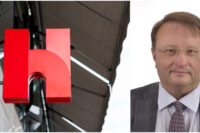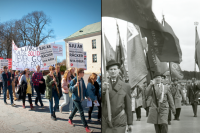
When Victor Ponta became prime minister of Romania last month, many hoped this would mark a turning point in the country’s political culture. As head of the Social Liberal Union, Ponta set out a compelling vision for renewal of Romania’s economy, society and democracy. Surprisingly, given his progressive leaning, Ponta’s vision was welcomed by the Wall Street Journal. And his leadership received a resounding endorsement form the Romanian people earlier this month, when his coalition secured a landslide victory in the regional elections.
However, Ponta’s success seems to have upset the old guard and incumbent President, Traian Băsescu. The new prime minister now finds himself enmeshed in a series of political controversies that seem designed to derail his program of reform and undermine his popularity. The young progressive is thus facing his toughest challenge to date.
Earlier this week, Nature magazine published an article based on a dossier from an anonymous source claiming that the prime minister’s doctoral thesis on the International Criminal Court had been plagiarized. Quite why this source chose to go to Nature is unclear or, for that matter, why Nature chose to publish the accusation.
Ponta, naturally, has vehemently denied to the allegations. This is not surprising. As a young lawyer, in 1999 Victor Ponta was a member of the Committee in charge of drafting the rules and procedures of the International Criminal Court, a delegate of the Romanian public government. Since then, he has played a crucial role in shaping how Romanians understood their relationship with the court.
The prime minister is also being strongly defended by the academy in Romania. His professors have defended him publicly. So have those he is accused of plagiarizing. Indeed, one of them, Ion Diaconu, had already written the preface to the public version of the same thesis when it was published some eight years ago.
To many commentators in Romania, the plagiarism charges seem at best spurious; at worst politically motivated.
Interestingly, prior to the story breaking, the prime minister had become ensnared in a fierce battle with the incumbent President Traian Băsescu regarding who should represent Romania at the upcoming European Council meeting in late June. Unlike France’s parliamentary democracy, where the constitution decrees that the president should represent the nation’s interests abroad, in Romania – like its neighbor Poland – representation is to be decided by parliament.
Earlier this month, parliament passed a motion nominating Ponta as the nation’s representative, which the President seems unwilling to accept. Meanwhile, the European Commission, which has listed Ponta as the Romanian representative to the Council, as it did when Polish Prime Minister Donald Tusk, faced similar difficulties when he first entered office.
For progressives, Ponta’s inclusion in the Council meeting is an important addition. In recent weeks, the prime minister has become an increasingly vocal advocate of the need to balance fiscal consolidation with policies designed to trigger growth, of which the adoption of a European jobs pact is crucial.
It also matters for Romanians. Ponta has made increasing the countries capacity to absorb European Union Structural Funds – finance available to assist economic development – a government priority, and is planning to raise this at the Council meeting. His expertise in international law may also help unlock blockages in Romania’s accession to the the Schengen Agreement, the European Union’s customs union.
The stand off between President Băsescu and Prime Minister Ponta is set to intensify over the coming week, as preparations for the Council meeting gain pace. Those wishing to see political renewal in Romania must hope that Ponta remains resolute, and that the high-level stand-offs and dirty tricks he is currently encountering are the death bells of a political culture that is set to become a thing of the past.
Matt Browne är Senior Fellow på den amerikanska tankesmedjan Center for American Progress.
Fotnot: Texten har tidigare publicerats av The Huffington Post och återpubliceras med benäget tillstånd av artikelns författare. Vi återkommer med våra internationella krönikor – oftast på svenska, ibland på engelska, norska eller danska – den 19 augusti.
Följ Dagens Arena på Facebook och Twitter, och prenumerera på vårt nyhetsbrev för att ta del av granskande journalistik, nyheter, opinion och fördjupning.
































